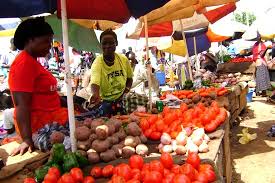Moses Uwagbale
Two days to the Easter Celebration, prices of food items have soared in major markets in Lagos.
A survey in some major markets, including the popular Mile 12, Oyingbo and Mushin on Thursday and Friday showed that prices of some food items jumped by more than 25 per cent.
A 40 kilogramme (kg) basket of tomato, which was sold for N6,000 in March has risen to N8,000.
The price of a 50kg bag of Scotch Bonnet pepper jumped by 50 per cent, selling for N14,000 against the previous N7,000.
Similarly, a 50kg basket of bell pepper (Tatashe) rose to N15,000 from N10,000.
The survey also showed that a 100kg basket of onions is now selling for N19,000, up from N14,000 last month.
25 litres of vegetable oil has risen from N17,000 to N19,500 but the same quantity of palm oil dropped from N18,000 to N12,000.
However, prices of 50kg of both local and foreign rice remained the same at N22,000 and N23,000 respectively for short grains in spite of the Easter celebration.
Mr Femi Odusanya, Spokesperson for Mile 12 Market Traders Association, attributed the situation to the seasonal nature of the farm produces.
According to him, harvest is winding down; another planting season is beginning and the variables of demand and supply factor caused the items to be more expensive.
Odusanya, however, appealed for the government’s intervention in the agricultural sector to engender large scale mechanised farming to address scarcity.
He said that such large scale farming would increase the sector’s Gross Domestic Product (GDP) contribution and improve the nation’s economy.
“What has happened is that harvest is winding down, supply is reducing while demand is constant.
“And with the Easter celebration, demand has increased so the price would go up.
“What the government can do is to initiate measures that would ensure mechanised farming all over the country.
“By so doing, the prices would be constant as supply is constant and able to meet up with consumption and processing into paste and other things for exportation.
“Money will also remain in the country, the nation will compete better in the Africa Continental Free Trade Area (AfCFTA) and disposable income will be more meaningful as people can plan better,’’ he said.




